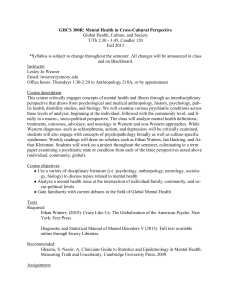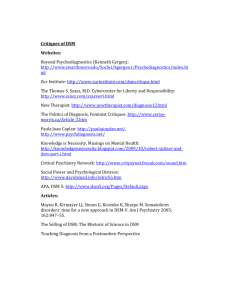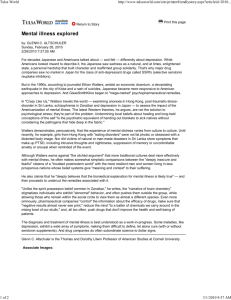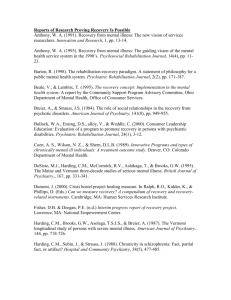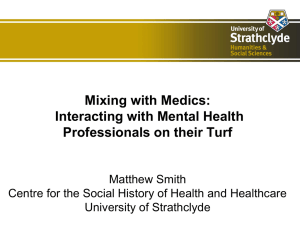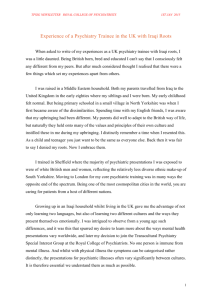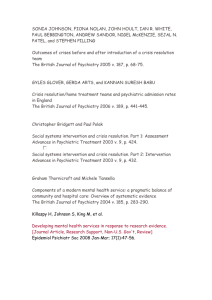Cross-cultural issues in mental health
advertisement
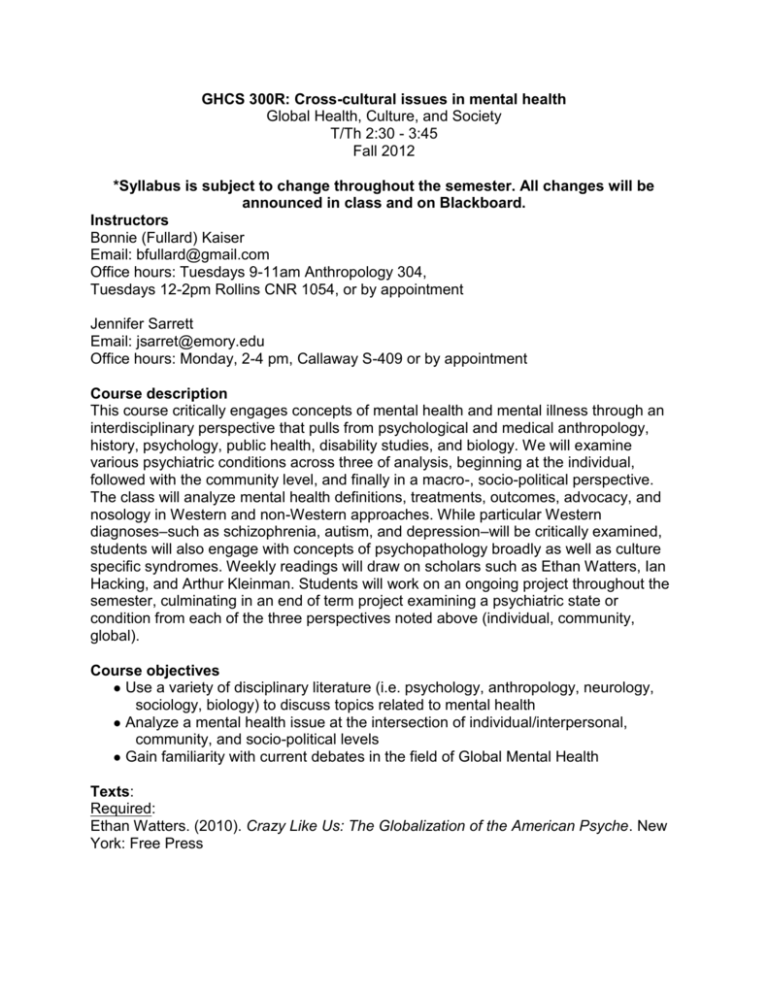
GHCS 300R: Cross-cultural issues in mental health Global Health, Culture, and Society T/Th 2:30 - 3:45 Fall 2012 *Syllabus is subject to change throughout the semester. All changes will be announced in class and on Blackboard. Instructors Bonnie (Fullard) Kaiser Email: bfullard@gmail.com Office hours: Tuesdays 9-11am Anthropology 304, Tuesdays 12-2pm Rollins CNR 1054, or by appointment Jennifer Sarrett Email: jsarret@emory.edu Office hours: Monday, 2-4 pm, Callaway S-409 or by appointment Course description This course critically engages concepts of mental health and mental illness through an interdisciplinary perspective that pulls from psychological and medical anthropology, history, psychology, public health, disability studies, and biology. We will examine various psychiatric conditions across three of analysis, beginning at the individual, followed with the community level, and finally in a macro-, socio-political perspective. The class will analyze mental health definitions, treatments, outcomes, advocacy, and nosology in Western and non-Western approaches. While particular Western diagnoses–such as schizophrenia, autism, and depression–will be critically examined, students will also engage with concepts of psychopathology broadly as well as culture specific syndromes. Weekly readings will draw on scholars such as Ethan Watters, Ian Hacking, and Arthur Kleinman. Students will work on an ongoing project throughout the semester, culminating in an end of term project examining a psychiatric state or condition from each of the three perspectives noted above (individual, community, global). Course objectives ● Use a variety of disciplinary literature (i.e. psychology, anthropology, neurology, sociology, biology) to discuss topics related to mental health ● Analyze a mental health issue at the intersection of individual/interpersonal, community, and socio-political levels ● Gain familiarity with current debates in the field of Global Mental Health Texts: Required: Ethan Watters. (2010). Crazy Like Us: The Globalization of the American Psyche. New York: Free Press Recommended: Ghaemi, S. Nassir, A. Clinicians Guide to Statistics and Epidemiology in Mental Health: Measuring Truth and Uncertainty, Cambridge University Press, 2009. Assignments Class Participation - This is not a course which just provides you with “facts” to learn, but rather a course which prompts you to reflect on the subjects we explore. You are expected to understand the facts and concepts, but also to develop a critical assessment of them. Therefore, we require close readings of the materials with a critical mind and active participation in class discussion for students to gain a) an in-depth understanding of the reading materials, and b) reflective thinking on the subjects we discuss. Just attending the class sessions will not lead to full credit. The quality of your class participation, and responding to other students’ presentations and their project presentation will also be assessed. Class attendance is a crucial part of your class participation. Response papers - 1-2 pages, due on Tuesdays by classtime Use one of the prompts below to address the previous week’s readings, pulling in other topics from class as desired. Prompts may only be used once; therefore, you will not use all of the prompts. If you have an idea for an alternative prompt that you would like to write about, see us a week before the paper will be turned in to discuss whether it is appropriate. A total of 5 response papers must be turned in throughout the semester, meaning all students will complete a response paper for 5 out of the 10 semester weeks between Tuesday, September 11 until Tuesday, November 20. You may only submit one response paper per week. All response papers must be turned in on Blackboard by classtime on Tuesdays and will cover the previous week’s readings. If you decide to turn in more than 5 papers, we will use the top 5 grades for your final grade. Prompts: In your response paper, indicate which prompt you are using. a. Synthesize the week’s readings b. Find an outside academic reading that is relevant to the course and tie it in to class readings c. Apply the week’s readings to the two class case studies d. Describe the concepts from the week’s readings to a generic audience (e.g. pretend you are doing a radio interview) e. Reflect on your thoughts, feelings, and experiences in regards to the week’s topic or class up until that week f. Write up your group’s position in your assigned debate g. Write a response to one of the blog posts or current events that we read in the course h. Module papers - One 5-page paper will be due at the end of each module (Oct 4, Nov 1, Nov 27) The module papers represent an ongoing semester project that you will synthesize in your final paper and panel presentation. Select a mental health issue (e.g. a diagnosis, stressor, intervention, or idiom) with particular relevance in a setting of interest to you. At the end of each module, you will submit a 5-page paper presenting your issue as a case study of the module concepts. You will be assigned one of the instructors based on expertise, who will serve as a mentor throughout the semester. Please work closely with us on these papers. You are welcome to attend office hours and/or discuss your papers with either instructor. However, you are required to meet with your mentor during office hours at least once per module to discuss your module papers. Final project - 15-18 page paper, developed by synthesizing the three 5-page papers, analyzing a mental health issue from the perspectives of individual/interpersonal, community, and socio-political. Due during the scheduled final exam: December 14 at 8:30am. Panel Presentations - At mid-semester, you will be grouped into 3-4 person panels based on your chosen mental health topics. You will collectively put together a conference-style panel presentation, including a title and abstract that represents your group’s topics. Each student will have 10 minutes to present their project and take questions. Grading System 1. Participation.............................................. 15% 2. Response papers (5).................................25% total (5% each) 3. Small Module Papers................................ 45% total (15% each) 4. Final presentation/synthesis......................15% (synthesis paper 5%, presentation 10%) A = ≥ 94% C = 74 - 76% A- = 90 - 93% C- = 70 - 73% B+ = 87 - 89% D+ = 67 - 69% B = 84 - 86% D = 60 - 66% B- = 80 - 83% F = < 60% C+ = 77 - 79% Classroom Behavior Some of the topics in class may be sensitive and/or controversial; thus, all students are expected to be respectful of all opinions, comments, and questions. Discussions are meant to be student directed and all comments will be listened to and respected; however, students are responsible for ensuring that their comments are appropriate for a classroom environment. Every student should come to class prepared to discuss that day’s topic and give equal time to all perspectives. If there is anytime in which any student feels uncomfortable, offended, or confused by classroom discussions, please bring this to our attention so we can appropriately address the issue. We encourage lively discussions and classroom exploration as opportunities to further our understandings on issues of culture and mental illness. There will be no use of technology in class, this includes laptops, cell phones, Blackberries, etc, unless it is to be used as an assistive technology. Anyone using these devices in the classroom without permission will automatically lose one point on a response paper. Students must wear appropriate attire to class. Attendance and Participation Students who attend every class during the semester will have their lowest response paper grade dropped. Students are expected to arrive to class on time; persistent tardiness (more than 3 times) will result in deductions from the attendance and participation grade. Participation is worth 15% of your overall grade, meaning if you are not in class and, when in class, not participating, this grade will affect your final course grade. E-mail Policy: Please write concise emails and allow at least 48 hours for response. For substantial questions, please talk to one of the instructors during office hours rather than using email, as it is mutually more beneficial. Plagiarism and the Honor Code: Full compliance with the University Honor Code is expected. See the website for details: http://college.emory.edu/home/academic/policy/honor_code.html. Many students each year are caught for plagiarism, which can result in a failing grade for the assignment, a failing grade for the whole class, or even more serious consequences. Always make sure in your written work when quoting or paraphrasing material that you indicate the source (including internet sources). If you have any questions at all in this regard, please consult appropriate reference materials (see the website above) or come and see the instructor. Course Schedule August 30: Introduction, syllabus 1. Watters, Ethan. (2010). “The Americanization of Mental Illness”. The New York Times, http://www.nytimes.com/2010/01/10/magazine/10psychet.html?pagewanted=all 2. Grinker, Roy R. (2010). “In retrospect: The five lives of the psychiatric manual.” Nature, 468. 168-170. 3. Hacking, Ian (1999) Chapter 3: Madness: Biological or Social? in The Social Construction of What? Cambridge: Harvard University Press. September 4: Global Mental Health; Course Case Studies 1. Patel, Vikram. (2010). “Global Mental Health: A new global health field comes of age.” The Journal of the American Medical Association, 303(19). 1976-1977. 2. Summerfield, D. (2008). "How scientifically valid is the knowledge base of global mental health?" British Medical Journal 336(7651): 992-994. September 6: Mental Health Statistics 1. Ghaemi, Nassir. (2009). A Clinician’s Guide to Statistics and Epidemiology in Mental Health: Measuring Truth and Uncertainty. Cambridge: Cambridge University Press. Chapters 1-3. 2. Daley, Tamara (2002). “The need for cross-cultural research on pervasive developmental disorders.” Transcultural Psychiatry, 39(4). 531-550. 3. Kogan, Michael et al. (2009). Prevalence of Parent-Reported Diagnosis of Autism Spectrum Disorder Among Children in the US, 2007. Pediatrics 124: 1395. Module 1: Engaging cross-cultural mental health at the individual and interpersonal level September 11: Schizophrenia in the Family 1. Watters, Ethan. (2010). “The shifting mask of schizophrenia in Zanzibar.” in Crazy Like Us: The Globalization of the American Psyche. p 127-186. New York: Free Press. 2. DSM 5 diagnosis on schizophrenia: Proposed Revisions, Rationale, Severity, and DSM IV: http://www.dsm5.org/ProposedRevision/Pages/proposedrevision.aspx?rid=411 September 13: Family Responses 1. Stein, Catherine H. & Wemmerus, Virginia A. (2001). “Searching for a normal life: Personal accounts of adults with schizophrenia, their parents, and well-siblings.” American Journal of Community Psychology, 29 (5): 725-746. 2. Marom, Sofi, Munitz, Hanan, Jones, Peter B, Weizman, Haggai, & Hermesh, Haggai. (2005). “Expressed Emotion: Relevance to rehospitalization in schizophrenia over 7 years.” Schizophrenia Bulletin, 31(3): 751-758. 3. Nunley, Michael. (1998). The involvement of families in Indian psychiatry. Culture, Medicine and Psychiatry, 22: 317-352. 4. In class video: Gerald: http://www.youtube.com/watch?v=i6h8IcI7R0&feature=relmfu September 18: What is normal? 1. Horowitz, Allan V. & Wakefield, Jerome C. (2007). Chapter 1: The Concept of Depression. in The Loss of Sadness: How Psychiatry Transformed Normal Sorrow Into Depressive Disorder. Allan V. Horowitz & Jerome C. Wakefield. p 3-26. Oxford: Oxford University Press 2. Clements, Paul et al “Cultural Perspectives of Death, Grief, and, Bereavement" 3. DSM Depression: Single Episode: http://www.dsm5.org/ProposedRevision/Pages/proposedrevision.aspx?rid=44# 4. DSM Depression: Recurrent: http://www.dsm5.org/ProposedRevision/Pages/proposedrevision.aspx?rid=45 - Module paper topic due on Blackboard September 20: Explanatory Models 1. Kleinman, Arthur. (1988). Chapter 2: The Person and Social Meanings of Illness. in The Illness Narratives: Suffering, Healing, and the Human Condition. New York: Basic Books 2. Napo, F., Heinz, A., & Auckenthaler, A. (2012). Explanatory models and concepts of West African Malian patients with psychotic symptoms. European Psychiatry, 27 (Supplement 2): S44-S49. September 25: Idioms and Ethnophysiology 1. Kohrt, B. A., & Harper, I. (2008). Navigating diagnoses: understanding mind-body relations, mental health, and stigma in Nepal. Culture, Medicine & Psychiatry, 32(4), 462-491. 2. Nichter, M. (2010). "Idioms of distress revisited." Culture, Medicine and Psychiatry 34: 401-416. September 27: Individual/Familial Traits 1. Good, Byron J. (1997). Studying mental illness in context: Local, global, or universal? Ethos, 25 (2): 230-248. 2. Tam, S., Tsang, HWH, Yee-Chiu, IP, & Chan, CSC. (2004). Preliminary evidence for the basis of self-concept in Chinese with mental illness. Quality of Life Research, 13(2): 497-508. October 2: Wrap-up Module 1 Module 2: Engaging cross-cultural mental health at the community level October 4: Resilience and Coping 1. Watters, Ethan. (2010). Chapter 1: The wave that brought PTSD to Sri Lanka. in Crazy Like Us: The Globalization of the American Psyche. p.65-126. New York: Free Press. 2. DSM Post-Traumatic Stress Syndrome: http://www.dsm5.org/ProposedRevision/Pages/proposedrevision.aspx?ri d=165 - First module paper due October 9: Treatment and Healing 1. Farmer, P. (2011). Haiti After the Earthquake. Jackson, TN, PublicAffairs. Chapter 1: The Catastrophe. pp 6-21. 2: Khoury, N., Kaiser, B., Brewster, A., Keys, H., & Kohrt, B. Explanatory models and mental health treatment: Is Vodou an obstacle to psychiatric treatment in rural Haiti?. Culture, Medicine, & Psychiatry 2012: DOI: 10.1007/s11013-11012-19270-11012. October 11: Culturally-Specific Values 1. Shaked, Michal (2005) The social trajectory of illness: Autism in the ultraorthodox community of Israel. Social Science & Medicine, 61: 2190-2200 2. DSM autism: http://www.dsm5.org/ProposedRevision/Pages/proposedrevision.aspx?rid=94 3. Love, David A. (2012). Is Jesse Jackson Jr doing a disservice to his constituents? The Grio, August 14. http://thegrio.com/2012/08/14/is-jesse-jackson-jr-doing-adisservice-to-his-constituents/ 4. Snowden, Lonnie R. (2001). Barriers to effective mental health services for African Americans. Mental Health Services Research, 3(4): 181-187. DOI: 10.1023/A:1013172913880 Fall Break: October 16 October 18: Diagnostic Categories 1. Canino, G., & Alegria, M. (2008). Psychiatric diagnosis - is it universal or relative to culture? Journal of Child Psychology & Psychiatry & Allied Disciplines, 49(3), 237250. 2. Samuel, Douglas B. (2012). Assessing personality in the DSM-5: The utility of Bipolar constructs. Journal of Personality Assessment, 93(4): 390-397. 3. Rousseau, Cécile, Measham, Toby, & Bathiche-Suidan, Marie. (2008). DSM IV, culture and child psychiatry. Journal of the Canadian Academy of Child and Adolescent Psychiatry, 17(2): 69-75. October 23: Culture-Bound Syndromes 1. Watters, Ethan. (2010). Chapter 1: The rise of anorexia in Hong Kong. in Crazy Like Us: The Globalization of the American Psyche. p. 2-64. New York: Free Press. 2. Rebhun, L. (2004). Culture Bound Syndromes. In Ember, C. and M. Ember. Encyclopedia of Medical Anthropology. New York: Kluwer. p 319. October 25: Comparing Mental Illness Across Cultures 1. Miller, Joan. (1997). The interdependence of interpretive ethnographic and quantitative psychological methodologies in cultural psychology. Ethos, 25(2): 164176. 2. Read each Lopes Cardozo, Betancourt, or Jayawickreme article. October 30: Wrap-up Module 2 Module 3: Engaging cross-cultural mental health at the socio-political level November 1: Political-Economic Motives in Diagnosis 1. Watters, Ethan. (2010). Chapter 4: The mega-marketing of depression in Japan. in Crazy Like Us: The Globalization of the American Psyche. p 187-248. New York: Free Press. -Second module paper due November 6: The Politics of Biological Psychiatry 1. Valenstein, Elliot S. (1988). Chapters 2: Discoveries of psychotherapeutic drugs & Chapter 3: Theories of drug action and biochemical causes of mental disorder. in Blaming the Brain: The Truth About Drugs and Mental Health. p. 9-94. New York: The Free Press. November 8: Access to Care 1. Saxena, S., Thornicroft, G., Knapp, M., & Whiteford, H. (2007). Resources for mental health: scarcity, inequity, and inefficiency. Lancet, 370(9590), 878-889. 2. Belkin et al. (2011). Scaling up for bottom billion: “5 x 5" implementation of community mental health care in low-income regions. Psychiatric Services, 62(12): 1494-1502. November 13: Drivers of Mental Illness 1. Miller, K., P. Omidian, et al. (2008). "Daily stressors, war experiences, and mental health in Afghanistan." Transcultural Psychiatry 45(5): 611-638. 2. Patel, V. (2001). Poverty, inequality, and mental health in developing countries. Poverty, Inequality, and Health: An international perspective. D. Leon and G. Walt. Oxford, Oxford UP: 247-262. November 15: Hegemony or Best Practices? 1. Re-read September 4th readings 2. Additional Readings TBA - Questions for Ethan Watters due - Meet with your panel November 20: Media Representations and Stigma 1. Garland-Thomson, Rosemarie. (2000). Seeing the disabled: Visual rhetorics of disability in popular photography. in The New Disability History American Perspectives Eds. P. Longmore and L. Umansky. New York University Press, 2000: 335-74. 2. Owen, Patricia R. (2012). Portrayals of schizophrenia by entertainment media: A content analysis of contemporary movies. Psychiatric Services, 63(7): 655-659. DOI: 10.1176/appi.ps.201100371 3. Park, Jun-Hyun, Choi, Young-Min, Kim, Bongseog, Lee, Dong-Woo, & Gim, MinSook. (2012). Use of the terms “schizophrenia” and “schizophrenic” in the South Korean news media: A content analysis of newspapers and news programs in the last 10 years. Psychiatry Investigation, 9(1): 17-24. DOI: 10.4306/pi.2012.9.1.17. 4. In class video: Sukeesh - Idea Star Singer Thanksgiving Break: November 22 November 27: Conversation with Ethan Watters 1. Kohrt, B., M. Jordans, et al. (2010). "Four principles of mental health research and psychosocial intervention for child soldiers: Lessons learned in Nepal." International Psychiatry 7(3): 58-60. 2. Kleinman, Arthur. (2009). Global mental health: A failure to humanity? The Lancet, 374(9690): 603-604. DOI: 10.1016/S0140-6736(09)61510-5. - Third module paper due November 29: Debates in Global Mental Health 1. Global mental health and its discontents: http://somatosphere.net/2012/07/globalmental-health-and-its-discontents.html 2. Watters, Ethan. (2010). Conclusion: The global economic crisis and the future of mental illness. in Crazy Like Us: The Globalization of the American Psyche. p 249256. New York: Free Press. - Panel title and abstract due December 4: Panel presentations December 6: Panel presentations December 11: Panel presentations and recap 1. Harris et al, J.H. A proposal to classify happiness as a psychiatric disorder. Br J Psychiatry. 1993 Apr; 162:539-42. Final paper due during scheduled final exam: Friday, December 14 at 8:30am
